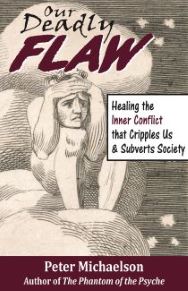We’ve all seen dysfunctional people create disorder in families, communities, and nations. It’s been an especially gruesome sight in recent decades. As a psychotherapist, I understand the roots of the problem. A specific psychological weakness, a flaw in human nature, is largely responsible for family and civic strife, as well as surging mental-health distress, mass delusions, and creeping authoritarianism.
This weakness or flaw is inner conflict, particularly the clash in our psyche between inner passivity and the inner critic. We’re able to escape from emotional suffering and self-defeat when the dynamics of this psychological conflict come into focus.
 The book is now available in paperback or as an e-book through the Books link here or directly at Amazon.com.
The book is now available in paperback or as an e-book through the Books link here or directly at Amazon.com.
The title, Our Deadly Flaw, refers to the pervasiveness of inner conflict in our psyche. It also refers to our unconscious compulsion to painfully recycle that conflict within ourselves as well as in our relationships with others.
The 315-page book exposes these dynamics with new, detailed insightfulness. Published this month, it’s titled, Our Deadly Flaw: Healing the Inner Conflict that Cripples Us and Subverts Society. My book provides an especially clear explanation of these dynamics. It’s three books in one: a self-help manual, a counter-extremism manifesto, and an inspiration and empowerment for saving our planet.
Our Deadly Flaw provides hundreds of examples of how unrecognized inner conflict damages us both personally and collectively. It’s written plainly enough for teenagers to read, and I do recommend it for young readers.
I believe in the power of this knowledge because of how it has benefited my readers and clients—but most of all for how it has helped me. I was neurotic and fated for failure before I discovered, in the mid-1980s, this depth psychology. I wouldn’t have been able to write any of my books—or even become a psychotherapist—without the strength this knowledge bestowed upon me.
Very few mental-health practitioners are offering this knowledge to their clients. People are largely unaware of how these unconscious forces contribute to their depression, anxiety, loneliness, and other distressful emotions. You’ll understand the point I’m making here by reading the book’s Introduction at the “Look Inside” feature at Amazon.
I’m hoping my readers and clients will make an effort to help circulate this knowledge. It’s important for our own self-development that we find ways to be helpful to others. The more people who assimilate this knowledge, the better their prospects and those of future generations.
